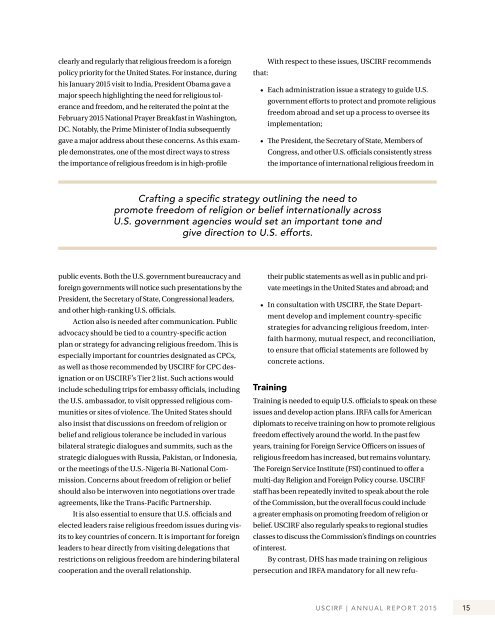USCIRF Annual Report 2015 (2)
USCIRF Annual Report 2015 (2)
USCIRF Annual Report 2015 (2)
Create successful ePaper yourself
Turn your PDF publications into a flip-book with our unique Google optimized e-Paper software.
clearly and regularly that religious freedom is a foreign<br />
policy priority for the United States. For instance, during<br />
his January <strong>2015</strong> visit to India, President Obama gave a<br />
major speech highlighting the need for religious tolerance<br />
and freedom, and he reiterated the point at the<br />
February <strong>2015</strong> National Prayer Breakfast in Washington,<br />
DC. Notably, the Prime Minister of India subsequently<br />
gave a major address about these concerns. As this example<br />
demonstrates, one of the most direct ways to stress<br />
the importance of religious freedom is in high-profile<br />
With respect to these issues, <strong>USCIRF</strong> recommends<br />
that:<br />
• Each administration issue a strategy to guide U.S.<br />
government efforts to protect and promote religious<br />
freedom abroad and set up a process to oversee its<br />
implementation;<br />
• The President, the Secretary of State, Members of<br />
Congress, and other U.S. officials consistently stress<br />
the importance of international religious freedom in<br />
Crafting a specific strategy outlining the need to<br />
promote freedom of religion or belief internationally across<br />
U.S. government agencies would set an important tone and<br />
give direction to U.S. efforts.<br />
public events. Both the U.S. government bureaucracy and<br />
foreign governments will notice such presentations by the<br />
President, the Secretary of State, Congressional leaders,<br />
and other high-ranking U.S. officials.<br />
Action also is needed after communication. Public<br />
advocacy should be tied to a country-specific action<br />
plan or strategy for advancing religious freedom. This is<br />
especially important for countries designated as CPCs,<br />
as well as those recommended by <strong>USCIRF</strong> for CPC designation<br />
or on <strong>USCIRF</strong>’s Tier 2 list. Such actions would<br />
include scheduling trips for embassy officials, including<br />
the U.S. ambassador, to visit oppressed religious communities<br />
or sites of violence. The United States should<br />
also insist that discussions on freedom of religion or<br />
belief and religious tolerance be included in various<br />
bilateral strategic dialogues and summits, such as the<br />
strategic dialogues with Russia, Pakistan, or Indonesia,<br />
or the meetings of the U.S.-Nigeria Bi-National Commission.<br />
Concerns about freedom of religion or belief<br />
should also be interwoven into negotiations over trade<br />
agreements, like the Trans-Pacific Partnership.<br />
It is also essential to ensure that U.S. officials and<br />
elected leaders raise religious freedom issues during visits<br />
to key countries of concern. It is important for foreign<br />
leaders to hear directly from visiting delegations that<br />
restrictions on religious freedom are hindering bilateral<br />
cooperation and the overall relationship.<br />
their public statements as well as in public and private<br />
meetings in the United States and abroad; and<br />
• In consultation with <strong>USCIRF</strong>, the State Department<br />
develop and implement country-specific<br />
strategies for advancing religious freedom, interfaith<br />
harmony, mutual respect, and reconciliation,<br />
to ensure that official statements are followed by<br />
concrete actions.<br />
Training<br />
Training is needed to equip U.S. officials to speak on these<br />
issues and develop action plans. IRFA calls for American<br />
diplomats to receive training on how to promote religious<br />
freedom effectively around the world. In the past few<br />
years, training for Foreign Service Officers on issues of<br />
religious freedom has increased, but remains voluntary.<br />
The Foreign Service Institute (FSI) continued to offer a<br />
multi-day Religion and Foreign Policy course. <strong>USCIRF</strong><br />
staff has been repeatedly invited to speak about the role<br />
of the Commission, but the overall focus could include<br />
a greater emphasis on promoting freedom of religion or<br />
belief. <strong>USCIRF</strong> also regularly speaks to regional studies<br />
classes to discuss the Commission’s findings on countries<br />
of interest.<br />
By contrast, DHS has made training on religious<br />
persecution and IRFA mandatory for all new refu-<br />
<strong>USCIRF</strong> | ANNUAL REPORT <strong>2015</strong> 15


